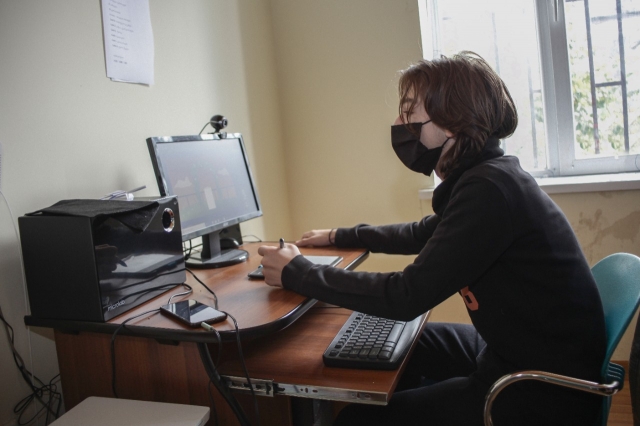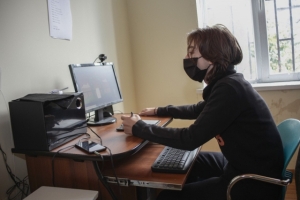Rural Youth Find New Education Options Online
Stay-at-home regimes have put many traditional educational opportunities out of reach of young people in Georgia, but some innovative new options are popping up online. The European Union (EU) and the United Nations Development Programme (UNDP) have launched a “weekend virtual school” for high-school students from Georgia’s regions which combines knowledge about European integration and sustainable development with extracurricular offerings featuring music and art. Over 330 participants from eight targeted municipalities – Lagodekhi, Dedoplistskaro, Kazbegi, Borjomi, Akhalkalaki, Tetritskaro, Keda and Khulo – participated in the first online classes on 21-22 November, and more are expected to engage in the next four sessions to be held every weekend until 20 December.
Supported by the EU and UNDP under their broader programme for agriculture and rural development (ENPARD-3), the weekend school is run in partnership with the Ministry of Education, Science, Culture and Sport and a team of supporters – the National Youth Agency, the Youth Regional Centre of the Ajara Autonomous Republic, the non-governmental Youth Network “Generation,” the non-governmental association “For Each Other” and the Local Action Groups (LAGs) established in the municipalities with the assistance from the EU and UNDP.
“It is encouraging to see digital tools employed to assist young people in getting knowledge and acquiring new skills,” said EU Ambassador Carl Hartzell. “The EU is committed to creating and supporting more learning opportunities for youth, especially in rural regions where educational resources are more limited than in the cities.”
“COVID-19 has a lot of downsides, particularly in disrupting classroom education,” said UNDP Head Louisa Vinton. “But one positive we are seeing is that digital forums can bridge vast distances and engage with anyone, anywhere, anytime.”
The list of prominent speakers lined up to address the teens included renowned European and Georgian scholars, practitioners and public figures, such as economist Vladimer Papava, Head of the National Parliamentary Library Giorgi Kekelidze, the European Commission representative Sigrid Brettel, founder of a Georgian company “Spilow” Sopo Chkheidze, Research Center Head at the Caucasus School of Media Giorgi Jologua and others.
The weekend school covers a wide range of topics, including the economic and social benefits of European integration and sustainable development, historic ties between Georgia and the EU, self-governance traditions in Georgia, gender equality and non-discrimination, innovative ways of doing business and digital solutions in communication and information management. Students will also learn how to distinguish information from “fake news” and propaganda.
The training program also includes career counseling and masterclasses in public speaking, arts, photography, cooking and dancing. Students will take part in fun contests and practical activities to help them acquire self-confidence, develop non-cognitive skills, connect more fully to society and ultimately improve their life prospects.
The EU and UNDP are long-term supporters of rural development in Georgia. More than GEL 600 million (EUR 179.5 million) in EU assistance has been allocated to Georgia under the ENPARD programme for 2013-2022. This support is designed to improve agricultural productivity, refine rural development policies and create new economic opportunities for rural communities, both in agriculture and outside of it.












